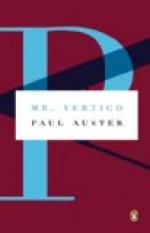|
This section contains 512 words (approx. 2 pages at 300 words per page) |

|
SOURCE: “Air Head,” in New Statesman and Society, April 8, 1994, p. 37.
In the following review, Edwards offers unfavorable assessment of Mr. Vertigo.
Since the New York Trilogy in 1986, Paul Auster's style has been unmistakable: erudite, laconic, minutely responsive to changes of light and mood. Auster's characters are beset by patterns and coincidences, driven by the urge to make sense of it all and become the authors of their own lives. The attempt is foredoomed, because nothing means anything: nothing matters beyond the bare fact of survival.
Auster's protagonists carry around thousands of dollars, then spend it all, lose it, gamble it away or simply forget about it. It makes no difference. Sleep rough and spend the day watching the clouds, your life will still be as valuable—will still be the same—as it ever was. When the money's gone. Auster's heroes head off into the blue again, unencumbered...
|
This section contains 512 words (approx. 2 pages at 300 words per page) |

|


